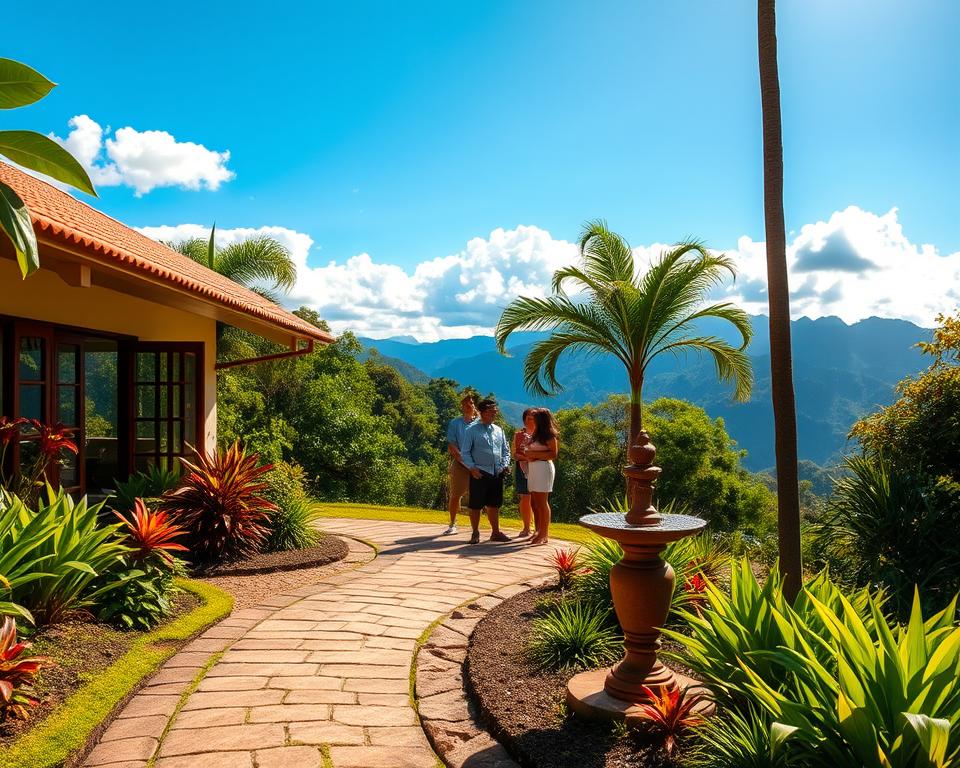Property Buying Strategies in Costa Rica: Expert Guidance
Imagine waking up to tropical beaches and lush rainforests. For many, this dream is becoming a reality in Costa Rica. Foreign investment in Costa Rica’s real estate has surged by over 30% in the past three years, according to the Costa Rican Chamber of Real Estate Brokers.
We’re here to guide you through the process. Costa Rica’s unique blend of natural beauty, political stability, and investor-friendly laws makes it an attractive destination for property buyers. However, buying property in a foreign country can be daunting, with challenges such as navigating different legal systems and cultural norms.
Our comprehensive guide aims to provide clarity and expert guidance, helping you make informed decisions from understanding the market to closing the deal.
Understanding the Costa Rican Real Estate Market
The allure of Costa Rica’s lush landscapes and vibrant culture is making it a hotspot for foreign property investment. Costa Rica’s real estate market is characterized by its unique blend of natural beauty, political stability, and economic opportunities, making it an attractive destination for international buyers.

Market Trends and Investment Potential
Costa Rica’s property market is experiencing a surge in interest from global investors, driven by the country’s exceptional lifestyle offerings and rental income potential. Popular areas like Samara, Nosara, and Tamarindo are beautiful due to their strong demand for short-term vacation rentals and long-term leases. The country’s political stability and strong democratic tradition further enhance its appeal as a safe investment destination in Latin America.
The economic opportunities available to property owners, particularly in the tourism and rental markets, are a significant draw. With its rich biodiversity and scenic environments ranging from beaches to volcanoes, Costa Rica offers a tropical lifestyle characterized by warm weather throughout the year, complemented by a welcoming culture and strong community networks, particularly among expatriates.
Why Costa Rica Attracts Foreign Buyers
Foreign buyers are drawn to Costa Rica for its exceptional lifestyle offerings, including year-round warm weather and scenic environments. The country’s welcoming culture and strong expatriate communities help foreign buyers transition to life in Costa Rica. Additionally, the potential for rental income in popular areas generates strong demand for property, making it an attractive investment opportunity.
Costa Rica’s real estate market offers a unique combination of lifestyle and investment potential, making it an ideal destination for foreign buyers. As we explore the legal framework and types of properties available, it’s clear that Costa Rica is a prime location for property investment.
Legal Framework for Foreign Property Ownership
Costa Rica’s legal system provides a unique set of rules and regulations for foreign property buyers. Understanding these regulations is essential for foreigners looking to invest in Costa Rican property.
Foreigners enjoy the same property rights as Costa Rican citizens, with some specific exceptions, particularly in maritime zones. Properties within 200 meters of the high-tide line are subject to maritime law.
Equal Rights for Foreign Buyers
Generally, foreigners have the same rights as locals regarding property ownership in Costa Rica. This equality under the law provides a secure environment for foreign investment.
Maritime Zone Regulations
The maritime zone, which extends 200 meters from the high-tide line, is regulated under maritime law. The first 50 meters are considered public land and cannot be privately owned. The next 150 meters are part of the restricted zone, where foreigners can lease or own property through a concession via a Costa Rican corporation.
To access properties in the restricted zone, foreigners must form a Costa Rican corporation, such as a Sociedad Anónima (S.A.) or Sociedad de Responsabilidad Limitada (S.R.L.), with at least 51% Costa Rican ownership. This requirement ensures that the property is held in compliance with local laws.
We will guide you through the process of navigating these regulations to secure desirable beachfront property access. Our expertise will help you understand the intricacies of Costa Rica’s legal framework for foreign property ownership.

By understanding the legal framework and collaborating with local experts, foreigners can confidently invest in Costa Rican property, knowing they are in compliance with all relevant laws and regulations.
Types of Properties Available in Costa Rica
Whether you’re looking for a tranquil mountain retreat or a vibrant city home, Costa Rica has it all. The country’s diverse geography and climate offer a wide range of properties to suit various tastes and preferences.

Beachfront and Ocean View Properties
Costa Rica’s coastline is dotted with stunning beachfront and ocean view properties. These properties offer breathtaking views, direct access to beaches, and a relaxed, tropical lifestyle. We find that beachfront properties are particularly popular among foreign buyers looking for a vacation home or rental investment.
- Direct access to beaches
- Breathtaking ocean views
- Potential for rental income
Mountain and Jungle Estates
For those seeking a more secluded and natural environment, Costa Rica’s mountain and jungle estates are an attractive option. These properties often feature private reserves, hiking trails, and scenic views, making them ideal for nature lovers and those looking for a peaceful retreat.
- Private reserves and hiking trails
- Scenic views and natural surroundings
- Opportunities for eco-tourism and conservation
Urban and Suburban Homes
In urban and suburban areas, particularly in and around San José, you will find modern condos, gated communities, and single-family homes. These locations offer proximity to amenities like shopping centers, hospitals, and schools, making them suitable for families and working professionals. We examine the advantages of these properties, including their potential for steady rental income.
- Proximity to amenities and services
- Variety of housing options, from condos to single-family homes
- Potential for rental income and long-term appreciation
In conclusion, Costa Rica’s real estate market offers a diverse array of properties, catering to different lifestyles and investment goals. Whether you’re drawn to the beach, the mountains, or urban living, there’s a property in Costa Rica to suit your needs.
Effective Property Buying Strategies in Costa Rica
To navigate Costa Rica’s property market successfully, one must employ effective buying strategies. The real estate market in Costa Rica is influenced by various factors, including location, property condition, and market trends.
Location-Based Investment Strategy
A key aspect of purchasing property in Costa Rica is selecting the ideal location. Different regions offer different benefits, from beachfront properties to mountain retreats. Understanding the potential for appreciation and rental income in various locations is crucial.
For instance, beachfront properties in popular areas like Tamarindo or Puerto Viejo can offer significant rental income during peak tourist seasons. On the other hand, mountain properties may be more suitable for those seeking a serene living environment or a potential retreat.
Timing Your Purchase for Maximum Value
Timing is everything when it comes to buying property in Costa Rica. The market can fluctuate based on seasonal demand, global economic conditions, and local factors. Understanding these dynamics can help you make a more informed purchase.
For example, purchasing during the off-season might give you more negotiation leverage, as there are fewer buyers. Conversely, buying in a seller’s market might require a more competitive offer.
By analyzing market trends, understanding the condition and potential of the property, and timing your purchase appropriately, you can maximize the value of your investment in Costa Rica’s property market.
The Step-by-Step Property Buying Process
Navigating the property buying process in Costa Rica can be complex, but with the right guidance, it becomes a straightforward experience. We will guide you through the essential steps involved in purchasing property in Costa Rica, from initial property search to the final closing.
Finding and Evaluating Properties
The first step in buying property in Costa Rica is finding the right property. This involves considering factors such as location, property type, and budget. We recommend working with a reputable real estate agent who has in-depth knowledge of the local market. They can help you identify properties that meet your criteria and provide valuable insights into the local area.

Making an Offer and Negotiation
Once you’ve identified a suitable property, the next step is to make an offer. Your real estate agent will help you determine a fair market price based on comparable sales in the area. They will also assist in negotiating the terms of the sale, including the price, payment terms, and any contingencies.
Closing the Deal
The final step in the property buying process is closing the deal. In Costa Rica, this involves working with a Notary Public who drafts and registers the property transfer deed. The Notary Public is a licensed attorney with special certification. During the closing meeting, both parties sign the necessary documents, and the buyer transfers the remaining purchase funds, taxes, and fees. The Notary Public then submits the property transfer deed to the National Registry to officially record the transaction. After closing, it’s essential to transfer utilities, secure property insurance, and take possession of the property.
By understanding and following these steps, you can ensure a smooth and successful property purchase in Costa Rica. Our team is here to guide you through every stage, ensuring that your transaction is handled efficiently and effectively.
Essential Legal Considerations
The legal aspects of purchasing property in Costa Rica can be complex, but with the right guidance, buyers can navigate this process with ease. Ensuring that all legal considerations are addressed is crucial for a successful transaction.
Title Search and Due Diligence
Conducting a thorough title search and due diligence is a critical step in the property buying process. This process involves verifying that the property title is clear of any liens or encumbrances and ensuring that the seller has the right to sell the property. A reputable attorney will guide you through this process, ensuring that your rights as a buyer are protected. In Costa Rica, this step is vital to avoid any future legal issues.
Working with a Qualified Attorney
Nothing is more important than securing the services of a reputable law firm when buying property in Costa Rica. A good real estate attorney will not only understand and carry out the property transfer process but also advise on the best way to own property, whether in your name or through a corporation. When selecting an attorney, look for someone with specific experience in Costa Rican real estate law. They will be responsible for reviewing contracts, ensuring property rights are clear, and executing transactions according to national law. Moreover, a qualified attorney can provide valuable advice on ownership structures, tax implications, and estate planning, making their role indispensable in the transaction process.
Working with a bilingual attorney is also highly recommended, as they can effectively communicate complex legal concepts in your native language, ensuring that you fully understand the implications of your decisions.
Financial Aspects of Property Purchase
The financial considerations involved in purchasing property in Costa Rica can be complex, but with the right guidance, buyers can navigate them effectively. When considering a property purchase, it’s essential to understand the various financial aspects involved.
Understanding Closing Costs
Closing costs in Costa Rica typically range from 3% to 5% of the purchase price and include fees for legal services, registration, and other expenses. Buyers should factor these costs into their budget to avoid unexpected expenses. For more information on the Costa Rican real estate market, you can visit Gap Real Estate, a trusted resource for expat buyers.
- Legal fees for property transfer
- Registration fees with the Public Registry
- Notary fees for document authentication
Property Taxes and Ongoing Expenses
Property taxes in Costa Rica are relatively low, averaging 0.25% to 0.35% of the property’s value annually. However, buyers should also consider ongoing expenses such as utility bills, maintenance, and potential community fees. Understanding these costs is crucial for budgeting and long-term financial planning.
Financing Options for Foreign Buyers
While mortgage options exist for foreign buyers in Costa Rica, they are limited. Most property purchases are made in cash or through private financing agreements. Costa Rican banks may offer financing under certain conditions, requiring extensive documentation, including proof of income and legal residency. Alternative financing options, such as seller financing and international loans, are also available.
- Cash purchases
- Private financing agreements
- Seller financing options
By understanding the financial aspects of property purchase in Costa Rica, buyers can make informed decisions and navigate the process with confidence.
Common Pitfalls and How to Avoid Them
When buying property in Costa Rica, foreign buyers often encounter pitfalls that can be avoided with proper guidance. Understanding these potential issues is crucial for a successful transaction in this beautiful country.
Due Diligence Mistakes
One of the most significant pitfalls for foreign buyers in Costa Rica is failing to conduct thorough due diligence. This can lead to unforeseen issues with the property, such as disputes over boundaries or hidden liens. To avoid this, buyers should work with reputable local experts who can guide them through the process.
- Verify the property’s title and ensure it’s free of any encumbrances.
- Conduct a thorough inspection of the property.
- Research the local area and community.
Legal and Contractual Issues
Legal and contractual issues can also pose significant challenges for foreign buyers in Costa Rica. All official documents are in Spanish, which can create confusion if not properly translated. To avoid misunderstandings, it’s essential to work with bilingual attorneys and agents who can accurately explain complex legal concepts.
Buyers should never rely on verbal agreements or informal “handshake” deals, as these are not legally binding in Costa Rica.
Cultural and Language Barriers
Cultural differences in business practices and language barriers can create significant challenges in Costa Rican real estate transactions. Working with bilingual professionals is essential to avoid misunderstandings. Effective cross-cultural communication is also crucial during property negotiations and transactions.
By being aware of these potential pitfalls and taking steps to avoid them, foreign buyers can ensure a smooth and successful transaction in Costa Rica.
Personal vs. Corporate Ownership
When considering property ownership in Costa Rica, individuals must weigh the benefits of personal versus corporate ownership. This decision is crucial as it impacts not only the initial purchase but also ongoing expenses, tax obligations, and estate planning.
Benefits of Forming a Costa Rican Corporation
Forming a Costa Rican corporation can offer several advantages, particularly for foreign buyers. One of the primary benefits is the facilitation of estate planning and inheritance, as corporate ownership can simplify the transfer of assets to heirs across different countries. Additionally, a corporation can provide a layer of anonymity and potentially reduce personal liability.
It’s also worth noting that setting up a corporation in Costa Rica is relatively straightforward and not excessively costly. Working with a knowledgeable real estate attorney can help navigate the pros and cons, ensuring that the decision aligns with the buyer’s overall strategy.
Tax and Estate Planning Considerations
The tax implications of personal versus corporate property ownership in Costa Rica can be significant. Corporate ownership may offer certain tax advantages, particularly for non-residents. However, it’s crucial to comply with both Costa Rican and home country tax laws to avoid any legal issues. Recent tax reforms in Costa Rica may affect the benefits of corporate ownership, and buyers should stay informed about these changes.
Estate planning is another critical aspect where corporate ownership can provide benefits. By holding property within a corporation, owners can more easily transfer assets to heirs without the need for probate, potentially reducing legal complexities and costs.
Gap Real Estate: Your Trusted Partner in Costa Rica

Gap Real Estate stands out as a leading authority in Costa Rica’s property market. With a deep understanding of the local real estate landscape, they provide expert guidance to individuals looking to invest in this beautiful country.
20+ Years of Coast-to-Coast Expertise
Gap Real Estate boasts over two decades of experience in Costa Rica’s real estate market, offering a wealth of knowledge that spans from coastal properties to mountain estates. Their extensive expertise ensures that clients receive the best possible advice tailored to their specific needs and goals.
Comprehensive Support Services
From the initial property search to post-purchase assistance, Gap Real Estate provides end-to-end support, handling everything from relocation logistics to complex legal details. Their results-driven approach prioritizes client success, whether it’s finding a dream home or securing a strategic investment.
For more information on how Gap Real Estate can assist you in your property purchase in Costa Rica, visit their website at www.gaprealestate.com, call or WhatsApp +(506)-4001-6413, or email them at [email protected].
Conclusion
As we conclude our exploration of property buying strategies in Costa Rica, it’s clear that the right approach can lead to a successful and rewarding investment. Throughout this article, we’ve covered the essential steps and considerations for navigating the Costa Rican real estate market.
Understanding the legal framework and your rights as a foreign buyer is crucial. Costa Rica offers equal rights to foreign buyers, making it an attractive destination for international investment. However, it’s vital to conduct thorough due diligence and work with qualified professionals to ensure a smooth transaction.
The diverse range of property options available across Costa Rica, from beachfront and ocean-view properties to mountain and jungle estates, offers a variety of choices for buyers. By employing a location-based investment strategy, you can maximize your investment potential. Whether you’re looking for a lifestyle change or a lucrative investment opportunity, Costa Rica has something to offer.
While challenges exist in foreign property purchases, they can be effectively navigated with the right approach and expert guidance. Gap Real Estate stands ready to assist you throughout your journey, providing comprehensive support services and coast-to-coast expertise.
In conclusion, buying property in Costa Rica can be a life-changing decision, offering a unique blend of lifestyle and investment opportunities. With the right preparation and professional support, you can confidently navigate the process and achieve a successful outcome. We encourage you to take the next step, leveraging the insights and strategies outlined in this article to make your Costa Rican property ownership dreams a reality.




